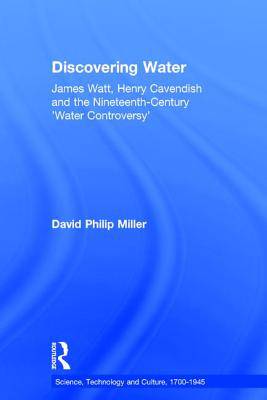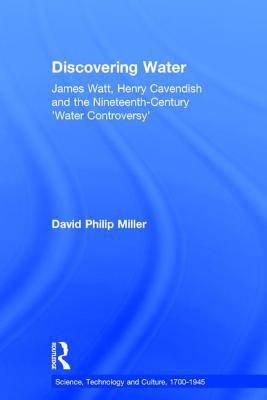
- Afhalen na 1 uur in een winkel met voorraad
- Gratis thuislevering in België vanaf € 30
- Ruim aanbod met 7 miljoen producten
- Afhalen na 1 uur in een winkel met voorraad
- Gratis thuislevering in België vanaf € 30
- Ruim aanbod met 7 miljoen producten
Zoeken
Discovering Water
James Watt, Henry Cavendish and the Nineteenth-Century 'Water Controversy'
David Philip Miller
€ 290,45
+ 580 punten
Uitvoering
Omschrijving
The 'water controversy' concerns one of the central discoveries of modern science, that water is not an element but rather a compound. The allocation of priority in this discovery was contentious in the 1780s and has occupied a number of 20th century historians. The matter is tied up with the larger issues of the so-called chemical revolution of the late eighteenth century. A case can be made for James Watt or Henry Cavendish or Antoine Lavoisier as having priority in the discovery depending upon precisely what the discovery is taken to consist of, however, neither the protagonists themselves in the 1780s nor modern historians qualify as those most fervently interested in the affair. In fact, the controversy attracted most attention in early Victorian Britain some fifty to seventy years after the actual work of Watt, Cavendish and Lavoisier. The central historical question to which the book addresses itself is why the priority claims of long dead natural philosophers so preoccupied a wide range of people in the later period. The answer to the question lies in understanding the enormous symbolic importance of James Watt and Henry Cavendish in nineteenth-century science and society. More than credit for a particular discovery was at stake here. When we examine the various agenda of the participants in the Victorian phase of the water controversy we find it driven by filial loyalty and nationalism but also, most importantly, by ideological struggles about the nature of science and its relation to technological invention and innovation in British society. At a more general, theoretical, level, this study also provides important insights into conceptions of the nature of discovery as they are debated by modern historians, philosophers and sociologists of science.
Specificaties
Betrokkenen
- Auteur(s):
- Uitgeverij:
Inhoud
- Aantal bladzijden:
- 330
- Taal:
- Engels
- Reeks:
Eigenschappen
- Productcode (EAN):
- 9780754631774
- Verschijningsdatum:
- 21/05/2004
- Uitvoering:
- Hardcover
- Formaat:
- Genaaid
- Afmetingen:
- 156 mm x 234 mm
- Gewicht:
- 639 g

Alleen bij Standaard Boekhandel
+ 580 punten op je klantenkaart van Standaard Boekhandel
Beoordelingen
We publiceren alleen reviews die voldoen aan de voorwaarden voor reviews. Bekijk onze voorwaarden voor reviews.







